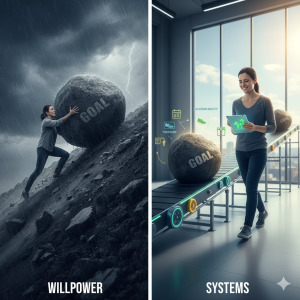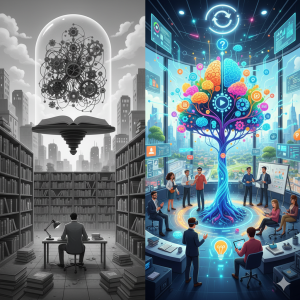
We give far too much credit to discipline and nowhere near enough to design.
After working with countless leaders, I have noticed a recurring pattern that is as frustrating as it is common. Most people believe they are failing because they lack “grit” or mental toughness. In reality, they are failing because their environment is actively working against them.
Willpower is often praised as the engine of success, but the truth is that it is a finite resource. It runs out. Fatigue sets in, focus fades, and even the most driven individuals eventually lose steam. If you have ever started a project with high energy only to see your momentum evaporate a few weeks later, the problem is not your character. The problem is your lack of a system.
The Willpower Battery
Relying on willpower is like expecting your phone to stay at a hundred percent all day without ever plugging it in. It might hold up for a few hours of heavy use, but eventually, the screen dims and the power cuts out.
This is why so many professionals sprint toward their goals only to collapse halfway. Willpower is a variable that fluctuates based on how much sleep you had or how many stressful meetings you sat through. Systems, on the other hand, are constants. They do not care how tired you are.
Designing for Momentum
When you stop trying to “motivate” yourself and start designing your environment to make the right actions easy, everything changes. You stop fighting yourself. You remove the friction that makes progress feel like a chore and you make the right choices automatic.
Stop Making Useless Decisions
Every tiny choice you make drains your battery. This is the logic behind why people like Steve Jobs wore the same outfit every day. It was not about fashion. It was about preserving decision-making energy for things that actually mattered.
If you want to protect your focus, you have to pre-schedule your day and batch your tasks. Use automation for the trivial stuff. The fewer decisions you have to make about how to work, the more energy you have to actually do the work.
Let Your Environment Do the Nudging
Habits are triggered by cues in your physical space. If you want to read more, put the book on your pillow in the morning so you have to move it to get into bed. If you want to exercise, lay your gear out the night before.
A good system does not try to ignore your weaknesses. It assumes you will be tired and lazy later in the day, so it designs the world around those moments to keep you on track anyway.
The Accountability Loop
Goals tend to die in silence. They grow much stronger when they are shared with a peer, a coach, or even tracked in an app. Accountability is not about adding pressure. It is about creating a structure that keeps your original intentions visible even when your motivation is low.
Watch the Process, Not the Scoreboard
The highest performers I know do not obsess over results. They obsess over the behaviors that create those results. If you want to grow a business, stop staring at the revenue and start tracking your daily outreach. If you want to get fit, stop looking at the scale and start counting the workouts. When you focus on the inputs, the outputs eventually take care of themselves.
Lower the Barrier to Entry
When a task feels too big to start, you are experiencing friction. The solution is to shrink the task until the resistance disappears. Cannot find the energy to write a report? Write a single paragraph. Cannot find an hour for the gym? Do ten minutes. Momentum is a much more powerful force than motivation, but you have to get moving first.
Design Always Wins
The most successful people are not necessarily the ones with the most discipline. They are the ones who have built the best systems. They have made the right choices the path of least resistance.
You do not need to find more willpower. You just need a better design for your day.









